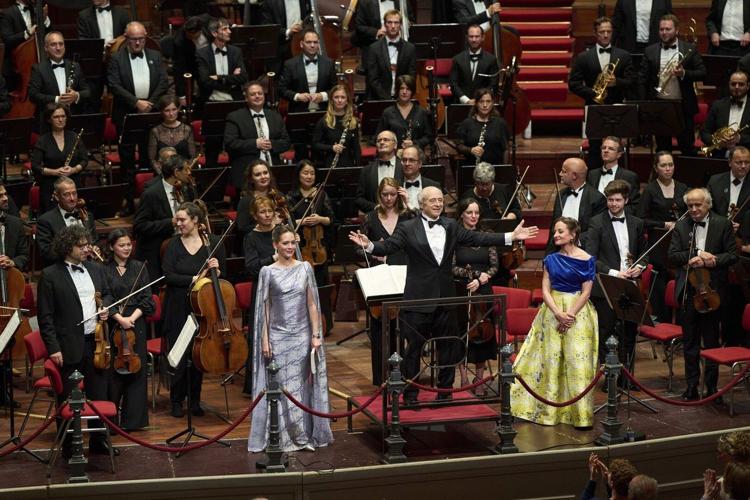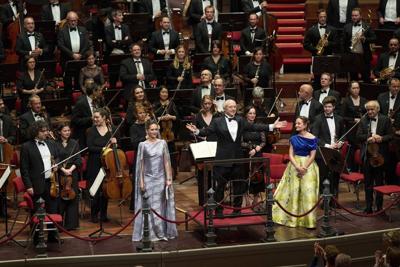AMSTERDAM (AP) ŌĆö When Klaus M├żkel├ż climbed the Concertgebouw podium and turned to the audience at the orchestraŌĆÖs third Gustav Mahler Festival in 105 years, the conductor could see the writing on the wall.
Facing him was ŌĆ£MAHLERŌĆØ etched in gold on a cartouche and shining in a spotlight, centered in a permanent position of honor among the 17 composers enshrined across the balcony front. And sitting in the first row directly behind the sign Friday night was Marina Mahler, the composerŌĆÖs 81-year-old granddaughter.
ŌĆ£It was just as it should be. I was terribly moved and excited at the same time,ŌĆØ she said after the final note of Symphony No. 1. ŌĆ£It affected me in the deepest possible way.ŌĆØ
All 10 of Mahler’s numbered symphonies are being presented in order along with his other major works from May 8-18, ending on the 114th anniversary of his death at age 50.
ŌĆ£This is in a way the first orchestra that really trusted in Mahler,ŌĆØ M├żkela said.
Joining the Royal Concertgebouw Orchestra are the Budapest Festival Orchestra, NHK Symphony Orchestra, Chicago Symphony Orchestra and Berlin Philharmonic, with conducting split among M├żkel├ż (Symphonies 1 and 8), Iv├Īn Fischer (2 and 5), (3 and 4), (6 and 7), (9) and Sakari Oramo (10). Programs are simulcast to a 1,500-seat amphitheater in Amsterdam’s Vondelpark.
ŌĆ£We have a U.S. orchestra for the first time in this festival,ŌĆØ said Simon Reinink, who headed the planning as general director of The Concertgebouw (the building, as opposed to the orchestra). ŌĆ£We also thought why shouldnŌĆÖt we invite an Asian orchestra?ŌĆØ
Early champion was in Amsterdam
Mahler’s first champion was Willem Mengelberg, who conducted the entirety of the first Mahler Festival in 1920 to celebrate his 25th anniversary as the Concertgebouw’s chief conductor. A second festival was held in 1995 to mark the 75th anniversary of the first festival and a 100th anniversary celebration was planned for 2020 and canceled because of the coronavirus pandemic.
ŌĆ£Mahler is really in the DNA of the orchestra,ŌĆØ said Dominik Winterling, managing director of Royal Concertgebouw Orchestra. “You feel it because we have a certain tradition, which is also passed on from generation to generation.”
Bruno Walter and Leonard Bernstein were Mahler’s other primary proponents in the 20th century.
ŌĆ£My father, who was a musician, always told me: `Mahler was a great conductor and a good composer with some problems. Usually the form is not perfect and itŌĆÖs formless,’ŌĆØ Iv├Īn Fischer said of S├Īndor Fischer, also a conductor.
When Bernstein led the Vienna Philharmonic in all of Mahler’s symphonies over a decade starting in the mid-1960s, there was resistance.
ŌĆ£In intervals, in corridors, everywhere musicians talk to each other, there was this: `Yes, itŌĆÖs good music but a little kitsch. Well, why does he need these bombastic effects?’” Iv├Īn Fischer recalled. ŌĆ£Really the cult of Mahler, where everybody started to love it, came after this cycle of Bernstein in Vienna but it was a spirit of the time. I think what created the breakthrough was that you didnŌĆÖt feel that music had to comport to certain norms and so it was a little liberation of the ‘60s, the time of free love, Beatles.”
Mahler has gained acceptance. The Fifth Symphony’s adagietto was conducted by Bernstein at President John F. KennedyŌĆÖs funeral and is featured in Luchino Visconti’s 1971 film ŌĆ£Death in VeniceŌĆØ and No. 2 sets a mood in a ŌĆ£The Picture of Dorian Gray.ŌĆØ
Klaus M├żkel├ż gets prominent role
Though just 29, M├żkel├ż was a natural fit to lead off with the first symphony because he becomes both and for the 2027-28 season. His exuberantly stepped down two dozen steps toward the podium to open his program with Anders Hillborg’s ŌĆ£Hell Mountain,ŌĆØ a world premiere commissioned for the festival that quotes two of Mahler’s works.
Van Zweden, who has a home a short walk from the Concertgebouw, was to open the canceled 2020 festival with the New York Philharmonic, when he was its music director. Van Zweden first heard Mahler When he was 6 or 7, van Zweden heard a fourth symphony led by Bernard Haitink, the Concertgebouw’s chief conductor from 1961-88. A violinist in his youth, van Zweden became the orchestra’s youngest concertmaster at age 19.
ŌĆ£The scores of Mahler, what he gave us is a GPS system about the road of his life,ŌĆØ he said. ŌĆ£He is such a human and we are such a witness of all the emotional roller-coasters and beauty and sadness and everything in his life during that performance. That is a different experience than a Tchaikovsky symphony.ŌĆØ
Luisi first heard Mahler when he attended a Fifth Symphony as a 15-year-old in Genoa, Italy.
ŌĆ£It was overwhelming. I didnŌĆÖt know that this music could be so passionate and intense all the time ŌĆö such a long symphony with a lot of different characters, different feelings, different moods,ŌĆØ he recalled. ŌĆ£I remember getting out of that concert shaking in pleasure and surprise.ŌĆØ
M├żkel├ż used a new edition of the score for No. 1 compiled by Michael Waterman, the fifth member of his family to play in the Concertgebouw in a lineage dating to 1950. With the help of his mom Cleora and friend Silvio Scambone, Waterman compiled markings going back to 1967. He now is working on editions of Nos. 5 and 9 based on notations dating to Mengelberg, who headed the orchestra from 1895-1945 before he was banned for his collaboration with Nazis.
On Saturday, Fisher took a five-minute break between the first and second movements of No. 2, specified by Mahler but not often followed. In a hall famous for its precise acoustics, he drew breathtaking playing from horns that scampered on and off stage like NFL special teams.
ŌĆ£So you hear these trumpets from heaven, everywhere, different directions,ŌĆØ he said.
M├żkel├ż is convinced Mahler has become more accessible in current times.
ŌĆ£It speaks to the audience now because itŌĆÖs music that everyone can relate to,ŌĆØ he said. ŌĆ£Because itŌĆÖs so personal, it somehow gives you a possibility to self-reflect.ŌĆØ

































To join the conversation set a first and last name in your user profile.
Sign in or register for free to join the Conversation